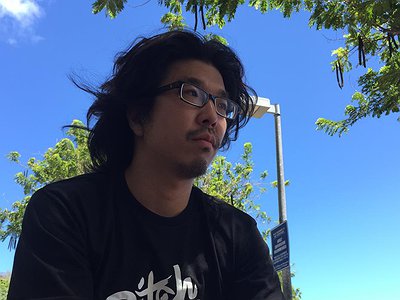With more and more musicians creating than ever and more and more of these creations being released, what does this mean for you as an artist in terms of originality? What are some of the areas where you currently see the greatest potential for originality and who are some of the artists and communities that you find inspiring in this regard?
I see potential of all kinds everywhere: in-genre, out-of-genre. The knowledge that there are "more and more musicians creating than ever", while occasionally an object of my awareness, doesn't haunt me, but I do keep myself insulated to a degree; if I tried to keep up with everything that was going on, I wouldn't have enough time or sanity left for my own endeavors. Quietude is my preferred studio.
Derek Bailey defined improvising as the search for material which is endlessly transformable. Regardless of whether or not you agree with his perspective, what kind of materials have turned out to be particularly transformable and stimulating for you?
Recently - the blank canvas; the void with no form; or the illusion of such. In my best improvisations the music happens so naturally that I wonder if I'm not playing something that's already been written by some mystic subterranean hand. This usually doesn't happen (and the "best" isn't always my favorite), but I know right away whether an improvisation is dead or alive. Bailey's words (and I'm not an expert on his work) remind me of that process of groping around until a plastic germ is found, that momentous epiphany whose development, or rejection, then becomes the crux of the improvisation's narrative.
Reaching audiences usually involves reaching out to the press and possibly working with a PR company. What's your perspective on the promo system? In which way do music journalism and PR companies change the way music is perceived by the public?
Even an impish grotesquerie like a Caravaggio is little more than anonymous on the walls of an office whereas on the walls of a museum or an auction house or in the pages of an art review the painting is framed in a glory that's impossible to ignore. Likewise, radio stations, music publications, record labels, television shows, etc., all have an extensive say in how music is perceived, or whether it's perceived at all. If you want to release music, regardless of its merits, then you (or someone else) must do PR, and it would behoove you to dispense with any scruples you have that might deceive you into thinking your art can stand alone in a marketplace where everyone is, very visibly, touted. Computers and the internet have made it possible for everyone to release an album and have it distributed and displayed worldwide cost-efficiently. This isn't a problem that today's musician has; having an album out for sale is hardly a mark of distinction. The challenge is distinguishing yourself in the enormous sea of identities that are all, more or less, equally available, not to mention the degree to which you allow this surfeit of content and the process of self-commercialization (which makes us talk of art as "products") to infiltrate, or even become, your work. The proliferation of music you’ve referred to has a corresponding blossoming of record labels and media outlets which is no coincidence. It reflects the increasing importance of their editorial and curatorial roles, as well as the decreasing influence of their financial sway, significant though this still is, especially in the case of record labels. Musicians with internet access can do much PR work on their own, and within a reasonable amount of time, by, for example, finding the addresses of radio and television stations, newspapers, magazines and blogs, to establishing and maintaining relationships with the people there who, whether you care for them or not, will elevate your work beyond the level of the omnipresent self-promotional.
What's your view on the role and function of music as well as the (e.g. political/social/creative) tasks of composers today - and how do you try to meet these goals in your work?
Even the most avowedly apolitical artist is political if you extend the concept of politics beyond the governmental to cover the arts of persuasion (articulated violence) as it relates to the proper means of conduct and judgment between beings. Far from being programs that we're indoctrinated into as adults, politics presents itself full force at the very instantiation of language, whose essential grammars impose a basic politics of relationships. The avant-gardist playing style B in a world of style A (in which he was raised) acts no less politically than the community activist advocating policy C as a replacement for policy B (compare this to the feral artist raised in the woods playing style B in a world of style A). What is the avant-garde? And, when we consider the lyric in relation to harmony in the various types of popular song, ironies manifest themselves in the fact that songwriters, no matter their politics or spirituality, repeatedly dip into the same well of chord progressions; looking only at the music of these songs - whether Christian, or communist, or Malthusian capitalist - you will see that each is more alike than not.
Do you have a musical vision that you haven't been able to realise for technical or financial reasons – or an idea of what music itself could be beyond its current form?
So far I've been fortunate enough to be able to make music without me or my family having to starve. My music hasn't been expensive to make. I do almost everything on my own from home. Sometimes I have musical visions that are beyond my technical or financial or practical reach (for example, ensemble projects, where managerial aplomb and factors of chance and compromise come into play) although I try not to dwell on these. I have given priority to those solo projects that are inevitably the self-summaries of a composer-performer squarely in the position of delimitation on the frontiers of possibility, weaving works whose playability is firmly rooted in the self-experiential.



